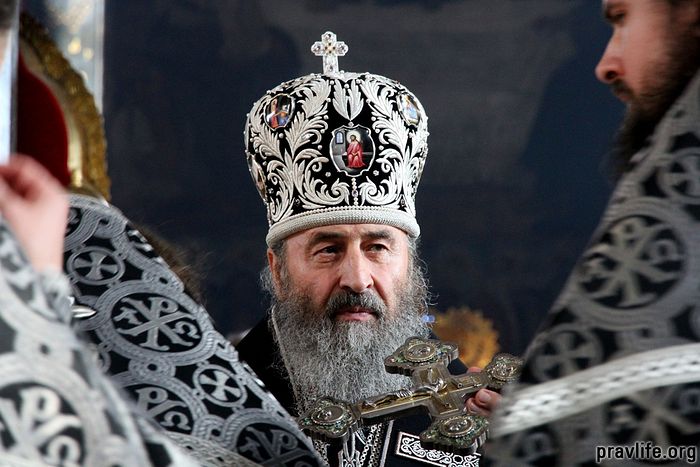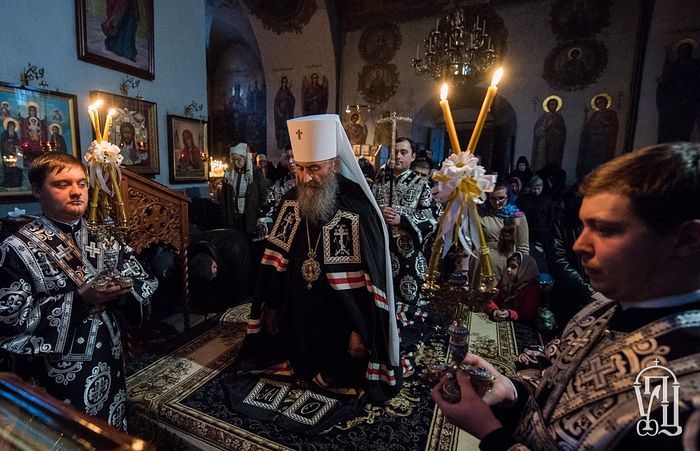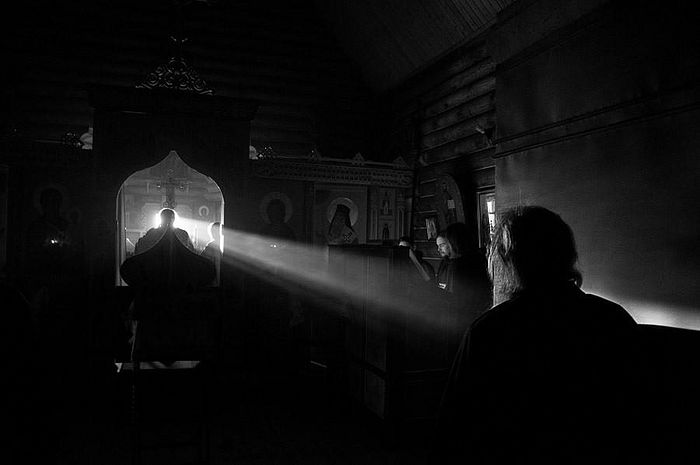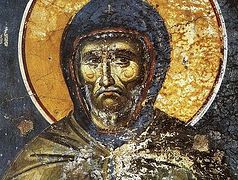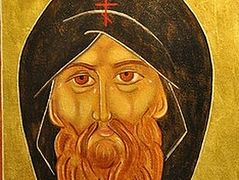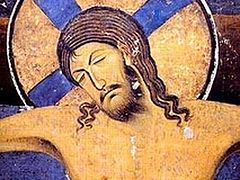The spiritual conversations, homilies, and statements of Metropolitan Onuphry are full of simplicity, accessibility, and spiritual wisdom. Such a combination is characteristic of experienced clergy, prayerfully concentrated on the needs of the flock handed to them, seeking as simply and deeply as possible to reveal knowledge of spiritual laws by their example, and to indicate the simple and clear path of attaining the saving grace of God. Listening to His Beatitude, you understand that his advice and counsels come from many years of personal experience of the spiritual life, and strict self-discipline.
Our conversation is about how to properly spend Great Lent, and how to avoid mistakes and extremes, in order to find “your measure” in your Lenten labors.
“If there is no commandment, man cannot develop spiritually and be perfected”
—Your Beatitude, we often hear the same complaint from the unchurched about Great Lent: Why such extremes—to eat only vegetable products for a month and a half before Pascha, often even without oil, and on certain days eating nothing? The opponents of the Church see something dictatorial and cruel even in the very concept of a “ban”…
—We mustn’t look at Lent as a ban. Fasting is one of the voluntary components of spiritual practice, and keeping the fast is an expression of our obedience to the Lord and His holy Church. Obedience was already introduced by the Lord to our forefathers Adam and Eve. There were many trees in the Garden of Eden that bore beautiful and desirable fruit, and Adam could eat from any of them, except for one. The Lord forbade it not because He didn’t want to share this fruit with Adam, but to give him a commandment of obedience, through which he could perfect his love for the Creator. If there is no commandment, man cannot develop spiritually and be perfected.
When children obey their parents, they thereby express their love for them. They are sorry to disappoint their parents, and when they are disobedient and do bad things, their conscience immediately begins to reproach them, and there arises a psychological barrier in communicating with their parents. And children often run to their parents with tears of repentance to remove the burden from their youthful soul. We, adults, must obey the holy Church, fulfilling its precepts, submitting to its typikon and its rules. And thanks to this obedience, our love for God grows through the grace received from Him. When we act contrary to the will of God, we depart from Him, and it’s difficult for us to be with Him as it was difficult for sinful Adam in Paradise.
We need Lent for the restoration of our spiritual health. After all, we’re not surprised when a doctor ascribes us a strict diet and abstinence from some items during a sickness. And so, the Church reminds us that Lent is a time for correcting our mistakes and infirmities, for overcoming our shortcomings, for spiritual rehabilitation, a time for marching towards God, rather than withdrawing from Him. Bodily abstinence and prayer help us in this.
“Eating fasting food with prayer, we heal body and soul”
—The favorite argument of those who are against Lent: Our bodies are weak at the end of winter, exhausted, we need calories, and our food should be plentiful…
—You know, people come up with a lot of stuff in their favor. Smokers say that cigarettes help them concentrate, and lovers of alcohol justifying its use by the relieving of stress and fatigue. In Great Lent the Church blesses abstinence from animal products, and to eat a predominantly plant-based diet intentionally. It’s not cruelty towards man. God created man and initially gave him vegetable food—diverse and beautiful. This food is natural, it is the healthiest, and it suits us most of all. When we eat it, we restore harmony to our bodies.
Being used to meat, we think that it’s impossible to live without it; but it turns out, it’s possible to live, and quite meaningfully. If someone never fasts and is accustomed to always having non-fasting food in his diet, this transition can seem quite difficult for him at first. But we have to go through this bodily realignment and be attentive to our food consumption, and try to eat what’s good for our body for life. After all, food can treat the body, such as herbs, fresh vegetables, and juices. Many plant products have protein: various nuts and various seeds. Eating such food with prayer, we revitalize both body and soul.
Of course, you shouldn’t impose some special podvigs, hunger strikes, upon yourself, but abide by a reasonable abstinence, as the Holy Fathers say—the golden mean, to walk the royal path, based on your own state of health. God has given every one of us reason, and we should adjust the standard and amount of our food. There’s also the clergy whom you can consult in this matter, if some difficulties and perplexities arise.
“We become like Christ, Who taught us abstinence”
—Why, Your Beatitude, is this fast called Great Lent? Is it just because it lasts for forty days and is followed by Holy Week?
—Great Lent precedes the very greatest feast—Pascha, the Resurrection of Christ, the greatest event in the history of mankind: the victory over death. Pascha gives us the pledge that we will also resurrect, that we will be inseparable from the Lord and with those whom we love. Christ is our Savior, pure God, perfect God, merciful God, full of wisdom. To meet the feast of the Pascha of Christ, the feast of Light and Life, the feast that brings with it Divine grace aplenty, we must prepare our souls for it through repentance and prayer. And the Church established holy Great Lent for us to be able to successfully complete this preparation.
This concerns not only bodily temperance, but temperance in feelings, in thoughts, and in language in communication, because fasting and prayer are two wings which bring a man near to God, help him cleanse himself, and give place in his soul for the grace of God. And blessed is that man who fasts and prayers fervently. There is no saint in the history of the Church who would not have resorted to fasting and prayer. In this work we become like Christ, Who taught us abstinence, fasting for forty days in the desert. He had no need to purify His soul, for the Lord is sinless, but in fasting, He gave an example of preparation for meeting Him.
—Any limitation causes discomfort and irritability. How can we avoid this during Lent?
—It’s not by chance that Lent is called the spiritual spring. Spring is always joyful for man. Lent brings us nearer to God, helps us restore within ourselves the image of God, distorted by sin, and helps us become godlike. Therefore, we must fast not in despondency, not in sorrow, but with a bright countenance. The Savior teaches us how we should fast.
The Gospel says we should wash our faces and anoint our heads with oil to appear as fasters before God, not before men. And God, seeing our perseverance in drawing near to Him, to be like unto His image, seeing our podvig in secret, recompenses us visibly (cf. Mt. 6:17-18). Anointing your head with oil may mean for us to be full of good thoughts and good wishes in relation to other people, to cast aside discontent, murmuring, envy, despondency, and hostility. The Lord, seeing our good aspirations and disposition of soul, will not leave it without recompense.
“Measure and prudence are important”
—Vladyka, tell us how to avoid extremes, since people have differing spiritual and physical strength, and the possibility of fasting and praying isn’t the same for everyone.
—Lent is a time of intensified work on yourself. During this period, our bodily abstinence should be greater than ever, and our prayer should be more than we usually do. But you need to feel your measure and try not to cross it, because every extreme is harmful. It is harmful when man overeats, and harmful when he fasts to such an extent that he becomes incapacitated. God gave man fasting for him to normalize his spiritual and bodily powers, and restore his spiritual and bodily health—not, in fasting unreasonably, to become an invalid. Therefore, we must gradually enter into Lent. Everyone knows what level he begins his fast from. And gradually, as you progress through Lent, you can limit your amount of food and drink and increase your prayer rule.
—And if a person is sick?
—If someone is sick and has been recommended a certain type of food, then he should speak with his spiritual father about such questions and take a blessing for a relaxed fast. The Church gives such a blessing of relaxation to pregnant women, those who are breastfeeding, and sick people. The measure of your relaxation should also be agreed upon with your spiritual father.
—Church services are especially long during Lent. How can we juggle them with work, studies, and household chores?
—Every person develops his spiritual life himself, depending on his possibilities, as far as time is concerned. If he has no chance to go to the Presanctified Liturgy during the week, he can go to an evening service for a bit, and he can pray at home, read the Psalter, the Sacred Scriptures, and the teachings of the holy fathers. He can put aside his usual TV watching, distance himself from the flow of political information, and think about who is in need of his help, who is suffering in loneliness. He can try to spend his time with discernment, for the benefit of his soul. Everything depends on our desire and attitude.
“Non-condemnation is the main virtue”
—It is said that the Prayer of St. Ephraim the Syrian contains a brief typikon for Great Lent, and for repentance as such…
—That really is true. His prayer enumerates all of a man’s main passions that must be uprooted, and the virtues that stand opposite these passions and which should counteract them. The main virtue, crowning this prayer, is non-condemnation: “Grant me to see mine own transgressions, and not to judge my brother.”
The Lord tells us in the Gospel: If we want the Lord to forgive us our transgressions, we must forgive those who have sinned against us. If this condition is not met, then no fasting, no prayer can help free us from sin. For the malice that fills a man and doesn’t allow him to forgive his brother gives no place for the grace of God in the soul of man. Therefore, we must try to root out the sins of resentment, condemnation, and hostility. Anything can happen in life. There are quarrels, offenses, and usually everyone thinks that he is more correct in the disputed question than his opponent. But if we want to receive forgiveness of our sins, we must lay aside all our arguments that justify ourselves, and go up and say, “Brother, sister, forgive me for the sake of Christ.” Although, sometimes it happens that we will say this with our mouths, but the offense will remain in our hearts. But, still, it’s good that we made the first step—beseeching forgiveness; and, gradually, the resentment will leave our souls.
—Vladyka, this is not the first year that prayers for peace and for the cessation of the fighting in Eastern Ukraine are lifted up daily in every church in Ukraine; and you have blessed all the faithful to read one kathisma a day during Lent, as in previous years.
—It is our humble sacrifice of prayer for our land, for our Ukrainian people, that the Lord would bless us with peace and would have mercy on us all. We know from Church history that increased prayer for peace is never in vain and always brings fruit. We believe that God hears our humble prayer.
—Your Beatitude, I would like to end the conversation with your wish and blessing for our readers.
—May the Lord help us to pass the time of the holy Forty Days in bodily temperance and in prayer according to our strength, that we might be accounted worthy to meet the great feast of the bright Resurrection of Christ with joy and peace.

